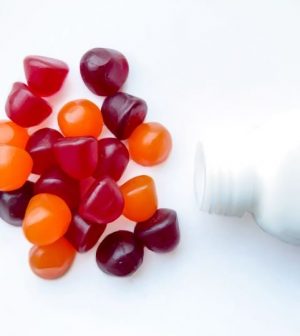- Could Your Grocery Store Meat Be Causing Recurring UTIs?
- Are You Making This Expensive Thermostat Error This Winter?
- Recognizing the Signs of Hypothyroidism
- 10 Strategies to Overcome Insomnia
- Could Artificial Sweeteners Be Aging the Brain Faster?
- Techniques for Soothing Your Nervous System
- Does the Water in Your House Smell Funny? Here’s Why
- Can a Daily Dose of Apple Cider Vinegar Actually Aid Weight Loss?
- 6 Health Beverages That Can Actually Spike Your Blood Sugar
- Treatment Options for Social Anxiety Disorder
ER Visits for Infant, Child Melatonin Poisonings Are Soaring

As more Americans pop over-the-counter melatonin to help them sleep, their young children are increasingly showing up in ERs after accidentally ingesting the supplements.
A new report of data from 2012 through 2021 finds a 420% rise in such cases during that time, along with a 530% increase in calls to poison control centers from people concerned about a child ingesting melatonin.
In the vast majority of cases, kids were not severely harmed and did not require hospitalization, said researchers from the U.S. Centers for Disease Control and Prevention.
However, “during 2019–2022, melatonin was implicated in 7% of all ED visits for unsupervised medication exposures by infants and young children,” noted a team led by CDC investigator Maribeth Lovegrove.
That’s about 11,000 cases over those three years.
Why are so many youngsters consuming melatonin in the home?
“At least half of ED visits for melatonin ingestions involved flavored products [gummies or chewable tablets] that are frequently used by and might appeal to young children,” Lovegrove’s group said.
The study was published March 7 in the CDC journal Morbidity and Mortality Weekly Report.
Lovegrove’s group noted that the use of over-the-counter melatonin by U.S. adults has quintupled over the past two decades.
They combed through a national database of ER admissions “for unsupervised melatonin ingestion by infants and children” between 2012 and 2021.
“Gummy formulations [47.3%] were the most commonly documented dosage form” in which kids ingested the supplement, the researchers noted.
In more than a third of cases, babies or toddlers swallowed 10 or more melatonin gummies or tablets. “At least 32.8% of infants and children accessed melatonin from a bottle,” the team added.
Melatonin supplements are not required to be sold in child-resistant bottles, and in most ED cases “infants and children opened bottles or that bottles were not properly closed,” according to the researchers.
“Selecting products with child-resistant packaging might be advisable in homes with young children,” Lovegrove’s group advised.
More information
Find out more about melatonin at the National Center for Complementary and Integrative Health.
SOURCE: Morbidity and Mortality Weekly Report, March 7, 2024
Source: HealthDay
Copyright © 2026 HealthDay. All rights reserved.










